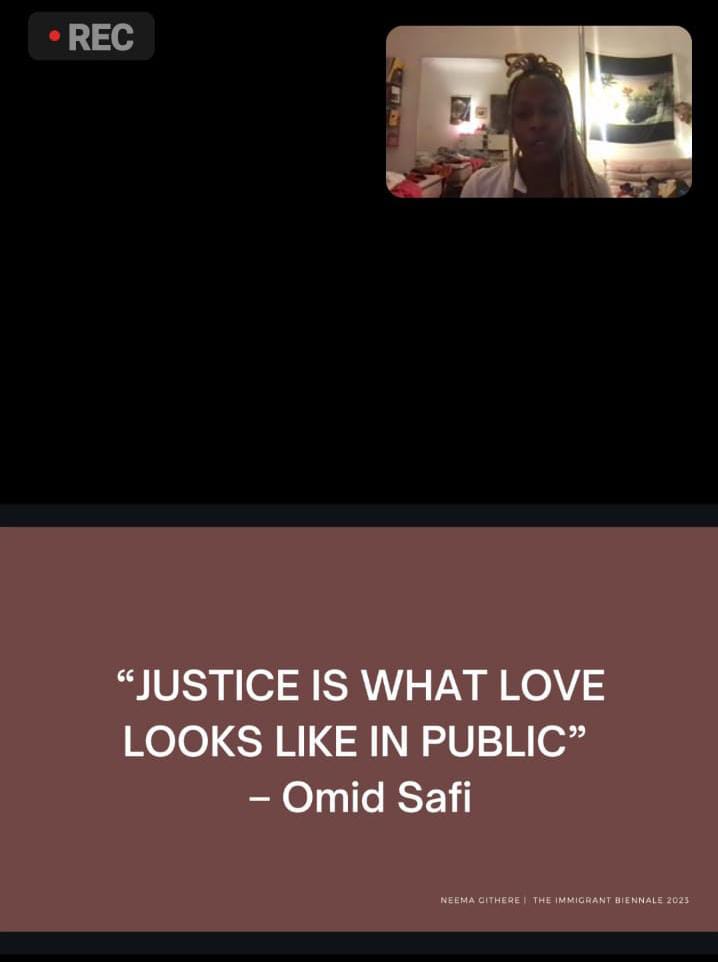A Workshop on Love and Afropresentism with Neema Githere


One Sunday, as the Israel-Hamas War raged, dividing nations and families, a workshop on Zoom begins with a penetrating question: “Whose love brought you here?” which led to a discussion about the technology of love. To me, linguistically, the technology of love means two different things: one, love as a technology and an instrument, and, two, the technologies available to us so that love can be manifested.
The first meaning of the term speaks to actions—imminent and full of force. Our host Neema Githere notes that “love” is a verb that transforms our reality. It is more concrete than being a fluffy, undefinable concept. It is as close to social activism and civil disobedience as it is to poetry, art, and (im)mortality. Love expresses itself through its many action-based synonyms. For instance, philosopher and activist Cornel West famously said: “Justice is what love looks like in public.” This view of justice is echoed by Omid Safi, a scholar of Sufism and Middle Eastern studies, in his 2016 article titled “Justice is Love, Embodied,” in which he writes: “If we seek a life of the spirit, how do we confront social injustice, poverty, racism, sexism, living under occupation, and violence by both states and non-state entities?” In our present time, this conversation seems ever-more-relevant, as many protests—an investment in love—are taking place in physical and virtual spaces but are frequently misconstrued as aggressive.
 Photo of Neema Githere. Courtesy of the artist and The Immigrant Artist Biennial.
Photo of Neema Githere. Courtesy of the artist and The Immigrant Artist Biennial.
We certainly dove right in. This online workshop, led by Kenyan-born guerilla theorist Neema Githere, aimed at exploring how we can aspire to situate our political and philosophical thinking at the intersection of technology, identity, heritage, and love. Presented in collaboration with The Immigrant Artist Biennial 2023 and Wendy’s Subway on October 29th, it took place during a time when the consumption of digital content was becoming increasingly challenging and even precarious at times. As a 2023-24 Practitioner Fellow at the Digital Civil Society Lab at Stanford University, Githere’s research focuses on how indigeneity and connectivity are fostered by technology and social media. In this session, they held space for difficult emotions, aspiring to understand colonial trauma to seek healing via “algorithmic debris”—a concept that quickly led us to consider computational sequences and data processing.
This allowed us to move on to the second interpretation of the technology of love: How do indigeneity and Afropresentism find themselves contemporary media? In Githere’s own words, Afropresentism is born from Kodwo Eshun’s Afrofuturism, and it emerges as a “genre fusing archival, documentary, and fine arts on and through new media in the articulation of an Afrofuturist lived reality.” The “-present-” in the term means to take up space and to consider what is currently at stake. In the digital realm, as we repost messages of empowerment via Instagram stories, these words, signs, numbers, and icons result in a “collective incantation” with spiritual tenacity and strength. If something you read off of your phone screen ever caused your heart to tremble, the collective incantation may be at work—from big data to somatic experiences, from intangible media to physical reality.
Ancestry was an operative word in the title of the workshop, and among the most enlightening moments of the session was when Gilbert Githere, Neema’s grandfather, spoke to us through pre-recorded videos. He pointed out that formulas are what’s bridging spoken language, incantation, oral history, and computer algorithm. Through this bridge, not only can one access ancestral wisdom, but we, as a generation, can also actively curate a new form of digital history, as an alternative or addition to material history.
Towards the last part of the discussion, participants of the workshop were invited to share their reflections on ancestral specificity, answering questions such as “Who are your ancestors? What did they do/overcome?” or “What is the present moment calling you to do?” This open system of sharing diasporic experiences ties to Guerrilla Theory, which focuses on the decentralization, or “constellation,” of knowledge acquisition; it “emphasizes conversation as the highest mode of speculation.” A thought-provoking topic that emerged from this discussion was indigenous mental health: For survivors of colonial trauma, is it effective, or just, to use Western-centric epistemological systems and medical manuals such as the DSM (Diagnostic and Statistical Manual of Mental Disorders), which were likely born out of socio-academic contexts with lingering colonial legacies as well as unequal representation?
Many questions remain, but we are pointed towards a more healing and optimistic way of thinking. Neema Githere’s workshop offered a deep and multidimensional exploration of topics like ancestry, love, technology, and decolonization. By encouraging open conversations and by challenging conventional perspectives, the workshop invited participants to think critically about the power of the internet and all forms of algorithms that we interact with on a daily basis, oftentimes unknowingly. Underscoring the various formats of love—care, critique, stewardship, intention, justice, and so on—this workshop sent a powerful message of hope at a time when we need it most.
Art Spiel and Cultbytes are, for the second time, proud media sponsors of the biennial, and this review series is published as part of TIAB’s writer’s residency generously supported by Lesley Bodzy Studio and Fraser Birrell Grier, Esq.
You Might Also Like
Art as an Act of Hope: The Ukrainian Pavilion in Venice and Artists in Flux
On Governors Island, You Can Look into the “Eye” of an Oyster
What's Your Reaction?
Xuezhu Jenny Wang is a multilingual translator and content creator. In addition to writing about postwar and contemporary visual culture, she is working on a research project that focuses on mid-century interior design and mechanization.

